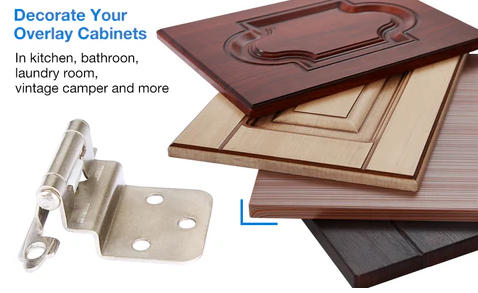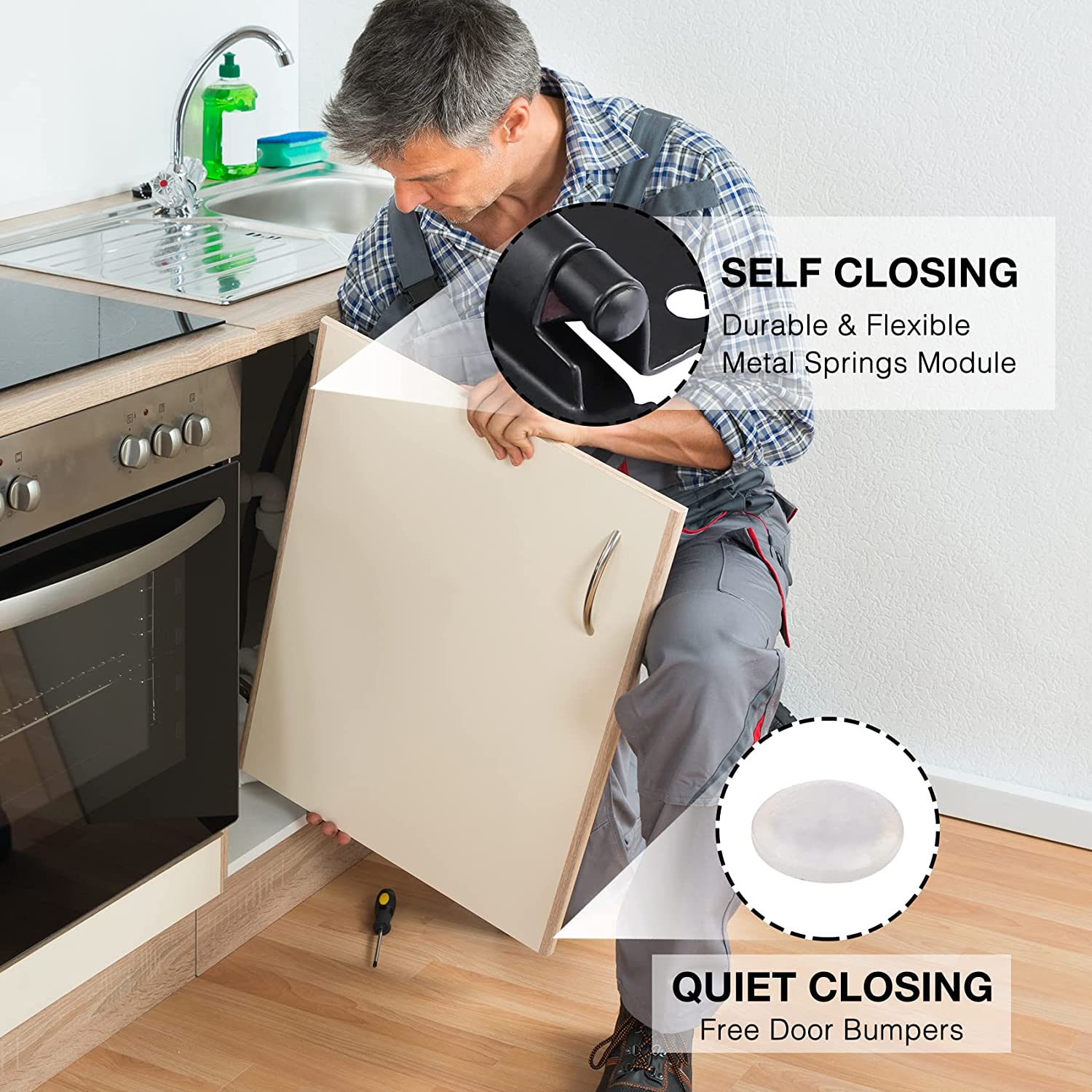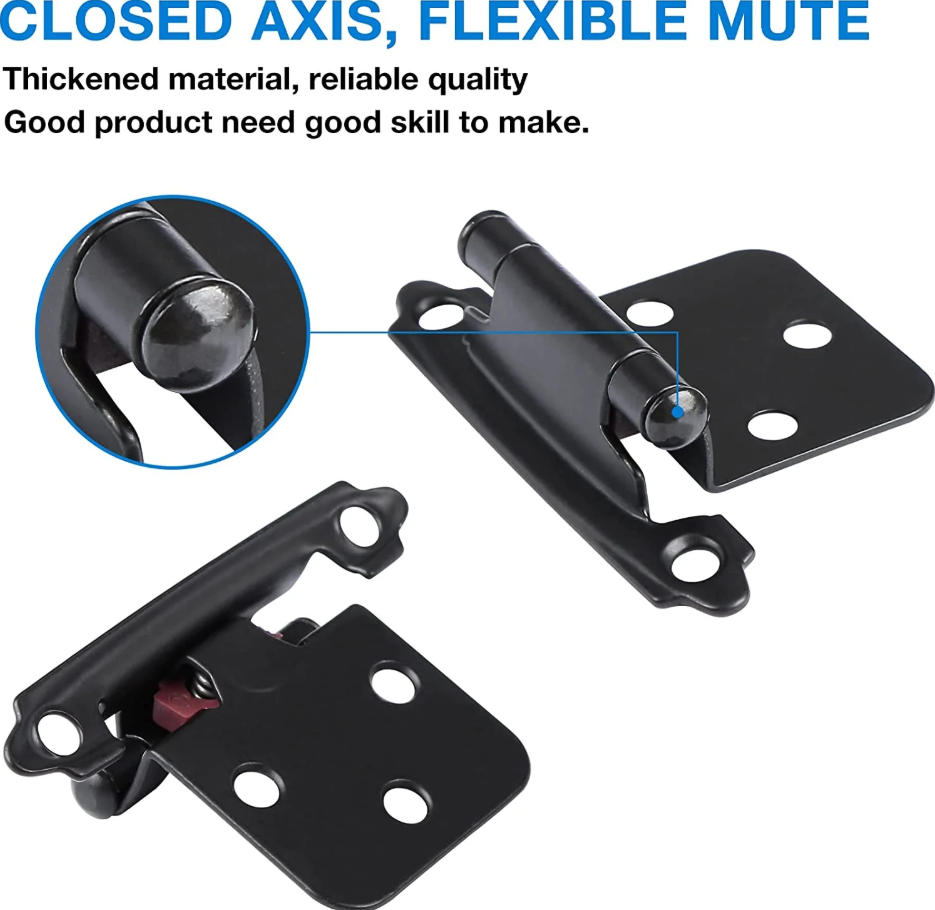Comparing Soft Closing and Self Closing Interior Door Hinges
The main difference between soft closing interior door hinges and self closing hinges lies in their mechanisms and benefits.
Soft closing interior door hinges prevent slamming, reduce noise, and lower the risk of finger injuries.
Self closing hinges help keep children safe by automatically closing doors.
Soft Closing vs Self Closing
What Are Soft Closing Interior Door Hinges?
Soft closing interior door hingesrepresent a modern upgrade in cabinet door hinge types. These hinges use a soft-close mechanism that slows the door as it closes, preventing slamming and reducing noise. Homeowners often choose soft-close hinges for bedrooms, offices, and living spaces where quiet operation matters. The most common materials for these hinges include stainless steel and solid brass. These materials provide durability, corrosion resistance, and smooth operation, ensuring the soft-close feature works reliably over time. Regular maintenance, such as cleaning and lubrication, helps maintain the performance of soft closing interior door hinges and extends their lifespan.
Soft-close cabinet hinges also add a layer of safety by minimizing the risk of pinched fingers. Many families with children or elderly members prefer these hinges for their gentle, controlled motion. The elegant appearance of brass and the strength of stainless steel make soft-close cabinet hinges suitable for a variety of interior design styles. Choosing the right material depends on door weight, environmental conditions, and personal preferences, all of which affect the performance and longevity of
soft-close hinges.

What Are Self-Close Cabinet Hinges?
Self-close cabinet hinges belong to a broader category of cabinet door hinge types designed for automatic door closure. These hinges use mechanical springs to pull the door shut once it reaches a certain angle. Self-close cabinet hinges are popular in kitchens, bathrooms, and utility rooms where doors need to stay closed for safety or cleanliness. Unlike soft-close hinges, self-close cabinet hinges may close the door with more force, sometimes resulting in a louder sound if not paired with a damping system.
Self-close cabinet hinges work well for heavy doors and in environments where durability is essential. Many commercial spaces, such as hotels and fire-rated rooms, rely on self-close hinges for their resilience and ability to handle frequent use. The mechanical design of self-close cabinet hinges ensures a constant closing force, making them suitable for both residential and commercial applications.
How the Mechanisms Work
The main difference between soft closing interior door hinges and self-close cabinet hinges lies in their internal mechanisms. Soft-close hinges use a hydraulic hybrid system with oil-controlled dynamic braking. This soft-close mechanism absorbs shocks and vibrations, allowing the door to close smoothly and quietly. The hydraulic system controls the speed of closure, preventing slamming even if someone pushes the door forcefully or if wind is present.
Self-close cabinet hinges, on the other hand, rely on mechanical springs and heat-treated components. These springs provide a constant, resilient closing force that pulls the door shut. While self-close hinges excel in heavy-duty and exterior environments, they may allow the door to slam if wind or user force exceeds the spring’s tension zone.

Tip: Most soft-close hinges are also self-close, but not all self-close hinges offer soft-close features. Homeowners should consider their specific needs when choosing between these cabinet door hinge types.
The table below summarizes the key mechanical differences:
Feature/Aspect | Self Closing Hinges (Mechanical) | Soft Closing Hinges (Hydraulic Hybrid) |
Mechanism | Mechanical springs and heat-treated components | Hydraulic hybrid with oil-controlled dynamic braking |
Closing Force | Constant, resilient closing force suitable for heavy doors | Smooth, gradual, quiet closing with dynamic speed control |
Environmental Suitability | Heavy-duty, exterior, harsh environments (acid, chemical, salt) | Interior, quiet, breezy environments |
Door Weight Range | Heavy doors (200-440 lbs) | Typically lighter doors, interior use |
Wind Resistance | Resilient but can slam if wind exceeds spring setting | Absorbs shocks and vibrations, prevents slamming in wind |
Durability & Maintenance | High durability, 10-year warranty for interior & exterior use | Lower durability in exterior, 5-year interior warranty, risk if door opens beyond 120° |
Noise Level | Moderate, can slam under strong wind | Very quiet due to hydraulic damping |
Typical Applications | Hotel rooms, fire-rated doors, heavy-duty commercial doors | Offices, glass doors, screen doors, quiet areas |
Limitations | Speed control limited to spring tension zone | Risk of damage if door opens beyond 120 degrees |
Soft-close cabinet hinges and self-close cabinet hinges both play important roles in modern cabinetry. Soft-close hinges provide a premium, quiet experience, while self-close hinges deliver reliable closure in demanding environments.
TDC' s Expertise in Both Types
TDC stands out as a leading manufacturer of cabinet door hinges, offering both soft-close and self-close solutions. The company brings over 35 years of experience to the industry, producing a wide range of cabinet door hinge types for residential and commercial use. TDC' s catalog includes soft closing interior door hinges, soft-close cabinet hinges, and self-close cabinet hinges, all crafted from high-quality materials like stainless steel and anodized aluminum.
TDC' s expertise covers customization, ensuring each soft-close hinge or self-close hinge fits the client' s exact needs.
Advanced manufacturing processes and strict quality control guarantee reliable performance and long-lasting durability.
TDC supports customers with fast shipping, expert guidance, and responsive service, making them a trusted partner for contractors, wholesalers, and door companies worldwide.
TDC' s commitment to quality, customization, and innovation positions them as a top choice for anyone seeking dependable soft-close or self-close cabinet hinges.
Features Comparison
Noise and Safety
Noise reduction and safety remain top priorities for homeowners choosing between soft-close hinges and self-close hinges. Soft-close hinges use hydraulic dampers to slow the door’s movement, which helps eliminate banging and slamming. This mechanism ensures a quiet environment, especially in bedrooms, offices, and nurseries. Self-close hinges, in contrast, rely on spring-loaded systems that pull the door shut. While these hinges keep doors closed and prevent children or pets from wandering, they do not stop the door from slamming. This can lead to loud noises and a higher risk of finger injuries.
According to the US National Safety Council, over 300,000 door-related injuries occur each year, many caused by slamming doors. Soft-close hinges help reduce these incidents by providing a controlled, gentle closure. In kitchens or workshops, this feature adds an extra layer of safety, making soft-close hinges ideal for families with young children or elderly members.
Feature | Soft-Close Hinges | Self-Close Hinges |
Mechanism | Hydraulic/pneumatic system slows door closing to prevent slamming | Spring-loaded mechanism pulls door shut but can slam |
Safety | Prevents finger injuries and door slamming, ideal for homes with children | Does not prevent slamming, higher risk of finger injuries and noise |
Noise Control | Quiet closing, reduces disruptive noise | Does not prevent slamming, can be noisy |
Soft-close hinges provide a premium cabinet hardware experience by combining noise reduction with enhanced safety. Self-close hinges offer reliable closure but may not deliver the same level of protection or quiet operation.
Durability and Maintenance
Durability and maintenance play a significant role in the longevity of cabinet door hinge types. Soft-close hinges, with their hydraulic dampers, reduce wear and tear by controlling the speed and force of closure. This controlled motion helps extend the lifespan of both the hinge and the door. Self-close hinges, which use springs, may experience faster wear due to abrupt closure, especially in high-traffic areas.
User reviews and best practices recommend cleaning both soft-close and self-close hinges every three to six months. High-use areas, such as kitchen cabinets, may require more frequent maintenance. Regular inspections help identify loose screws, misalignment, or signs of wear early. These steps ensure that both hinge types maintain optimal performance and longevity.
TDC manufactures high-quality cabinet hardware using premium materials like stainless steel and anodized aluminum. Their advanced manufacturing processes and strict quality control standards contribute to the durability and reliability of both soft-close and self-close hinges. Homeowners who choose TDC benefit from hinges designed for long-term use and minimal maintenance.
Installation Tips
Installation requirements differ between soft-close and self-close hinges. Soft-close hinges feature more complex mechanisms, which can make installation slightly more challenging. These hinges may require precise alignment and careful handling to ensure the hydraulic damper functions correctly. Some soft-close models, such as insert clip tops, offer tool-free installation, while others need drilling and secure mounting.

Self-close hinges have a simpler design, making them easier and faster to install. The process usually involves positioning the hinge, marking screw locations, securing the hinge, and adjusting the spring mechanism. Homeowners with basic DIY skills can often install self-close hinges without professional help.
Professional installers recommend taking extra care with soft-close hinges to guarantee optimal performance. Proper installation ensures the longevity and smooth operation of both hinge types.
TDC supports customers with expert installation guidance and resources, helping contractors and homeowners achieve the best results. Their commitment to premium cabinet hardware and customer service makes TDC a trusted partner for any installation project.
Pros and Cons
Soft-Close Hinges
Soft-close hinges deliver a premium experience for homeowners who value quiet and safety. These hinges use advanced hydraulic dampers to slow the door’s movement, preventing slamming and reducing noise. Many families appreciate the added protection against finger injuries, especially in homes with children or elderly residents. Soft-close hinges also help extend the life of cabinets by minimizing impact and wear.
Pros:
Quiet operation creates a peaceful environment in bedrooms, offices, and nurseries.
Enhanced safety reduces the risk of pinched fingers.
Prolongs cabinet and hinge lifespan by absorbing shocks.
Adds a touch of luxury and modern appeal to any space.
Cons:
Higher initial cost compared to standard or self-close hinges.
Installation may require more precision to ensure proper function.
Hydraulic components may need occasional maintenance for optimal performance.
Homeowners seeking a blend of safety, durability, and elegance often choose soft-close hinges for their interior doors and cabinets.
Self-Close Cabinet Hinges
Self-close hinges offer practical benefits for busy households and commercial spaces. These hinges use mechanical springs to pull doors shut automatically, ensuring cabinets remain closed and contents protected. Home improvement experts highlight several advantages:
Benefit Category | Explanation |
Convenience and Efficiency | Automatically closes cabinet doors, saving time and effort, especially useful in busy areas like kitchens. |
Increased Safety | Prevents doors from being left open, reducing risks for children, pets, and during events like earthquakes. |
Protection of Contents | Keeps cabinet contents safe from dust, pests, moisture, and contamination by ensuring doors remain fully closed. |
Enhanced Aesthetics | Discreet, sleek hinge design that complements various décor styles and reduces visual clutter. |
Longevity and Durability | Made from high-quality materials resistant to rust and wear, ensuring long-lasting smooth operation. |
Additional advantages include:
Simplifies closing cabinet doors, especially when multitasking in the kitchen.
Reduces wear and tear by preventing slamming.
Creates a quieter home environment.
Ensures cabinets stay securely closed, lowering injury risks for children.
Some users note that self-close hinges may allow doors to close with more force, which can result in noise if not paired with a soft-close feature. However, their ease of installation and reliable closure make them a popular choice for kitchens, bathrooms, and utility rooms.

Choosing the Right Hinge
When to Choose a Soft Close Hinge
Experts suggest choosing a soft close hinge in environments where noise reduction and door protection are priorities.
Kitchens with heavy cabinet use benefit from soft-close hinges, reducing wear and noise.
Bathrooms require hinges that resist corrosion and prevent slamming; soft-close hinges with rust-resistant finishes excel here.
Bedroom closets gain sophistication and quiet operation from soft-close hinges.
High-traffic areas and homes with children or pets see improved safety and comfort with soft-close hinges.
TDC’s soft-close and self-close hinges receive high ratings for durability, noise reduction, and ease of use. Their product range covers various finishes and room types, making TDC a reliable choice for homeowners seeking quality and performance.
Feature | Soft-Close Hinges | Self-Close Hinges |
Mechanism | Damper for quiet closing | Spring for automatic closure |
Noise Level | Reduces noise | Noticeable “thump” |
Cost | Premium | Budget-friendly |
Homeowners can explore TDC’s blog for hinge guides, installation tips, and product details. TDC provides expert support and durable solutions for every project.
FAQ
What is the main benefit of soft-close hinges?
Soft-close hinges prevent slamming, reduce noise, and protect fingers. They create a quiet, safe environment, especially in homes with children or elderly residents.
Can self-close hinges be used on heavy doors?
Yes. Self-close hinges work well on heavy doors. Their spring mechanism provides reliable closure for both residential and commercial applications.
How does TDC support hinge installation?
TDC offers expert installation guidance, online resources, and responsive customer service. Their support helps contractors and homeowners achieve optimal hinge performance.
To Provide You with Better Service

Contact
Tel: +8613325838282
Add: 6265 Providence Way Eastvale,CA 92880




